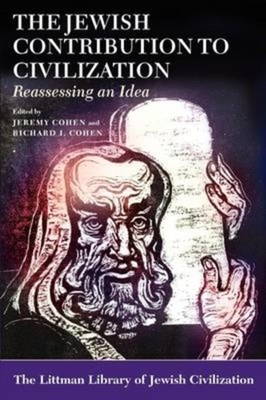
- We will send in 10–14 business days.
- Publisher: Littman Library of Jewish Civilization in Association with Liverpool University Press
- ISBN-10: 1906764433
- ISBN-13: 9781906764432
- Format: 15.6 x 23.4 x 1.4 cm, minkšti viršeliai
- Language: English
- SAVE -10% with code: EXTRA
Jewish Contribution to Civilization (e-book) (used book) | bookbook.eu
Reviews
Description
The biblical idea of a distinct 'Jewish contribution to civilization' continues to engage Jews and non-Jews alike. This book seeks neither to document nor to discredit the notion, but rather to investigate the idea itself as it has been understood from the seventeenth century to the present. It explores the role that the concept has played in Jewish self-definition, how it has influenced the political, social, and cultural history of the Jews and of others, and whether discussion of the notion still has relevance in the world today. The book offers a broad spectrum of academic opinion: from tempered advocacy to reasoned disavowal, with many variations on the theme in between. It attempts to illustrate the centrality of the question in modern Jewish culture in general, and its importance for modern Jewish studies in particular. Part I addresses the idea itself and considers its ramifications. Richard I. Cohen focuses on the nexus between notions of 'Jewish contribution' and those
of 'Jewish superiority' David N.
the world of Islam. Part III introduces us to various applications and consequences of the debate. Yaacov Shavit probes the delicate balance forged by nineteenth-century German Jewish intellectuals in defining their identity. Mark Gelber moves the focus to the present and considers the post-war renewal of German Jewish culture and the birth of German-Jewish studies in the context of the 'contribution' discourse. Bringing the volume to its conclusion, David Biale compares three overviews of Jewish culture and civilization published in America in the twentieth and twenty-first-centuries.
EXTRA 10 % discount with code: EXTRA
The promotion ends in 23d.04:23:07
The discount code is valid when purchasing from 10 €. Discounts do not stack.
- Publisher: Littman Library of Jewish Civilization in Association with Liverpool University Press
- ISBN-10: 1906764433
- ISBN-13: 9781906764432
- Format: 15.6 x 23.4 x 1.4 cm, minkšti viršeliai
- Language: English English
The biblical idea of a distinct 'Jewish contribution to civilization' continues to engage Jews and non-Jews alike. This book seeks neither to document nor to discredit the notion, but rather to investigate the idea itself as it has been understood from the seventeenth century to the present. It explores the role that the concept has played in Jewish self-definition, how it has influenced the political, social, and cultural history of the Jews and of others, and whether discussion of the notion still has relevance in the world today. The book offers a broad spectrum of academic opinion: from tempered advocacy to reasoned disavowal, with many variations on the theme in between. It attempts to illustrate the centrality of the question in modern Jewish culture in general, and its importance for modern Jewish studies in particular. Part I addresses the idea itself and considers its ramifications. Richard I. Cohen focuses on the nexus between notions of 'Jewish contribution' and those
of 'Jewish superiority' David N.
the world of Islam. Part III introduces us to various applications and consequences of the debate. Yaacov Shavit probes the delicate balance forged by nineteenth-century German Jewish intellectuals in defining their identity. Mark Gelber moves the focus to the present and considers the post-war renewal of German Jewish culture and the birth of German-Jewish studies in the context of the 'contribution' discourse. Bringing the volume to its conclusion, David Biale compares three overviews of Jewish culture and civilization published in America in the twentieth and twenty-first-centuries.


Reviews